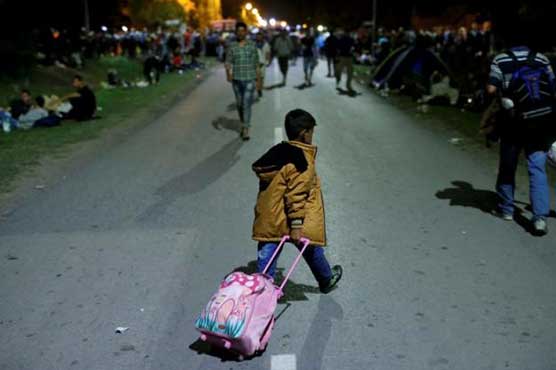Hungary builds fence as Croatia closes border crossings
Fed up with waiting for transport to continue their journey, huge crowds at the Croatian border town of Tovarnik pushed past police lines. Some kept travelling, and reached Slovenia overnight.
Croatia represents a longer and more arduous route into Europe, but those fleeing violence in their homelands have little choice now.
Since the start of the crisis the Croatian authorities have urged solidarity with migrants, recalling its own role in accommodating hundreds of thousands of refugees and displaced people during the 1990s Balkans wars. Croatia on Friday closed all border crossings with Serbia except one in an effort to control the flow of migrants which has strained authorities.
Migrants wait to board a train at the train station in Tovarnik, Croatia September 19, 2015.
Meanwhile, Slovenia announced late Thursday that it had stopped a train from Croatia carrying refugees, saying some 150 passengers would be returned to Zagreb because they did not have the necessary documents for onward travel.
The European Union will hold an emergency summit next week in a fresh attempt to deal with the disarray within the 28-member bloc on how to find a solution to the crisis. The Croat army has also been put on alert and is ready to be deployed.
Hungary is racing to complete another razor wire fence on its border with Croatia – it has already reinforced its borders with Serbia with a four meter high wall and more police.
Austrian police say around 6,700 have been allowed into the country since midnight.
A police statement said they would be registered, without giving details.
Hundreds also remained stranded at the Serbian border crossings, drawing protest from the country’s social affairs minister Aleksandar Vulin.
Much of the Croatian-Serbian border follows the Danube river, making it hard to cross outside the official border crossings. Police there estimated 5,000 migrants had entered the country so far, Reuters reported. “And we’ll keep doing it”, Milanovic told reporters in the northeastern town of Beli Manastir, from where numerous buses and trains have been leaving for the short trip to Hungary.
Serbia warned its neighbours against shutting down the main arteries between them.
Slovenia said police had stepped up checks in the border area with helicopter and land patrols.
“We will stay here until they let us through”, said Sami Bustani from Homs, Syria, whose large family, including two small children, sat on the ground eating only bread.
Officers wearing riot gear used tear gas and water canon on people trying to break through, receiving shock and condemnation from the UN’s Refugee Agency.












